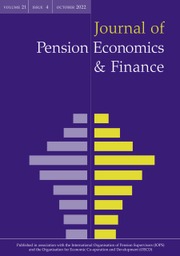Article contents
Does the actuarial adjustment for pension delay affect retirement and claiming decisions?
Published online by Cambridge University Press: 11 May 2022
Abstract
We investigate the impact of a 2005 policy that provided more generous terms for delaying state pensions in the United Kingdom. First, we find that the policy reduced the fraction of males and possibly females receiving pensions at the earliest eligibility age and shortly thereafter. This shift affected cohorts who became eligible for state pensions at or after the policy change. Second, the policy is associated with increases in male and female labor supply around the earliest pension eligibility age, consistent with some individuals working longer to finance pension delay. However, further analysis suggests that these labor supply changes are more likely to reflect longer-term trends across birth cohorts rather than a causal effect of the policy.
Keywords
- Type
- Article
- Information
- Copyright
- Copyright © The Author(s), 2022. Published by Cambridge University Press
References
- 1
- Cited by


